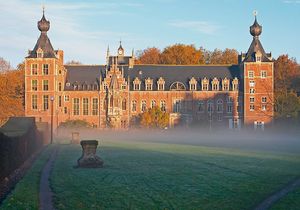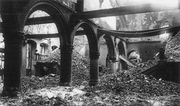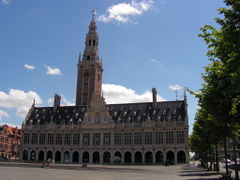Catholic University of Leuven

The Catholic University of Leuven, or Louvain, was the largest, oldest and most prominent university in Belgium. The university was founded in 1425 by John IV, Duke of Brabant and approved by a Papal bull by Pope Martin V.[1]
During France's occupation of Belgium in the French Revolutionary Wars, the university closed by a decree of the French Republic. After Belgium was annexed by the United Kingdom of the Netherlands, a State University of Louvain was founded in 1816, lasting until 1835. In 1834, a few years after Belgium gained its independence, the Catholic University of Leuven was refounded, taking this new name, and it is identified with the Old University.[2]
In 1968 the university split to form two institutions:
- Katholieke Universiteit Leuven, Dutch-speaking, situated in Leuven; and
- Université catholique de Louvain, French-speaking, situated in nearby Louvain-la-Neuve, in Wallonia.
This entry deals with the historic university, 1425–1797 and 1834–1968. For the current successor institutions and their separate development since 1968, see the individual articles linked above.
Contents |
History
The Old University (1425–1797)
In the 15th century the city of Leuven, with the support of John IV, Duke of Brabant, made a formal request to the Holy See for a university.[2] Pope Martin V issued a papal bull dated 9 December 1425 founding the University in Leuven as a Studium Generale. In its early years, the university was modelled on those of Paris, Cologne and Vienna. The university flourished in the 16th century due to the presence of famous scholars and professors, such as Adriaan Florenszoon Boeyens (Pope Adrian VI), Desiderius Erasmus, Johannes Molanus, Joan Lluís Vives, Andreas Vesalius, Ferdinand Verbiest and Gerardus Mercator.
The State University (1816–1835)
After the French Revolutionary Wars, by the Treaty of Campo Formio, this region was ceded to the French Republic by Austria in exchange for the Republic of Venice. Once formally integrated into the French Republic, a law dating to 1793 mandating that all universities in France be closed came into effect. The University of Leuven was abolished by decree of the Departement of Dijle on October 25, 1797.[3]
The region next became part of the United Kingdom of the Netherlands (1815–1830), and William I of the Netherlands founded a new university in 1816 in Leuven as a state university (Dutch: Rijksuniversiteit).
The Catholic University (1834–1968)
In 1830 Belgium became independent of the Netherlands. Belgian bishops founded a new Roman Catholic university in 1834, at Mechelen. In 1835 the recently founded Catholic University of Mechlin moved to Leuven, and changed its name to Catholic University of Leuven, where the State University had been closed. This is generally seen as a refounding of the old University of Leuven.[2]
In 1914, during World War I, Leuven was looted by German troops. They set fire to a large part of the city, effectively destroying about half of it. The library was lost, as well as about 300,000 books; and a huge collection of manuscripts, such as the Easter Island tablet bearing Rongorongo text E. In the early stages of the war, Allied propaganda capitalized on the German destruction as a reflection on German Kultur.
The split (1962–1970)
From its beginning in 1834 the Catholic University of Louvain provided lectures only in French. Latin was sometimes used in the theological Faculty. But in effect it was a French-language institution. Lectures in Dutch, the other official language of Belgium and the language actually spoken in Leuven, began to be provided in 1930.
In 1962, in line with constitutional reforms governing official language use, the French and Dutch sections of the university became autonomous within a common governing structure. Flemish nationalists continued to demand a division of the university, and Dutch speakers expressed resentment at privileges given to French-speaking academic staff and the perceived disdain of the local French-speaking community for their Dutch-speaking neighbours. Leuven is within Flanders, the Dutch-speaking region of Belgium.
Tensions rose when a French-speaking social geographer suggested in a televised lecture that an objective case could be made for changing the administrative status of the city of Leuven, to include it in a larger, bilingual 'Greater-Brussels'. Mainstream Flemish politicians and students began demonstrating under the slogan 'Leuven Vlaams - Walen Buiten' ('A Flemish Leuven - Walloons out'). Student demonstrations increased in violence throughout the mid-60s. Student unrest and questions of discrimination against ethnic Flemish brought down the Belgian government in February 1968.
The dispute was resolved in June 1968 by making the Dutch-language section an independent Katholieke Universiteit Leuven, which remained in Leuven. The French-speaking university, called the Université catholique de Louvain, was moved to a greenfield campus, Louvain-la-Neuve, 20 km southeast of Brussels where French is the official language. Acrimony about the split was long-lasting. At the present, research collaborations and student exchanges between the two "sister universities" take place with increasing frequency.
Library

The holdings of the modern Catholic University of Leuven date back to 1834. Its main collections were held in a building on Naamsestraat dating back to the 17th century. It should be noted that it was only the collections of the university since its refounding that were lost. The manuscripts and most valuable works of the pre-revolutionary Old University, were transported[4] to the National Library in Paris, while the bulk of the holdings (at least officially) was transferred to the Central School of Brussels, the official legal successor of the Old University of Leuven. The library of the Central School of Brussels had about 80,000 volumes, which then became part of the library of Brussels, and then the future Royal Library of Belgium where they are still found. The extensive archives of the Old University are now part of the National Archives of Belgium.

Following the destruction of the library, a new library building was constructed on Ladeuzeplein. It was designed by the American architect Whitney Warren in a neo-Flemish-Renaissance style, and built between 1921 and 1928. Its monumental size is a reflection of the Allied victory against Germany, and it is one of the largest university buildings in the city. The library's collections were rebuilt with donations from all around the world, outraged by the barbaric act which it had suffered. In 1940, during the second German invasion of Leuven, the building largely burnt down, including its 900,000 manuscripts and books. The blaze is thought to have started in an exchange of fire between the two armies, rather than a deliberate act. The building was rebuilt after the war in accordance with Warren's design.
The library's collections were again restored after the war, and by the fission in 1968 had approximately four million books. The split of the university into separate French-language and Dutch-language institutions in 1968 entailed a division of the central library holdings. This was done on the basis of alternate shelfmarks (except in cases where a work clearly belonged to one section or the other, e.g. was written by a member of faculty or bequeathed by an alumnus whose linguistic allegiance was clear). This gave rise to the factoid that encyclopedias and runs of periodicals were divided by volume between the two universities, but actually such series bear single shelfmarks.
The building on Ladeuzeplein is now the central library of the Katholieke Universiteit Leuven.
Notable alumni
-
- For post-1968 alumni, see Katholieke Universiteit Leuven or Université Catholique de Louvain.
- Jan Standonck (1454–1504), priest and reformer, Master of the Collège de Montaigu in Paris.
- Adriaan Floriszoon Boeyens (1459–1523), Pope Adrian VI.
- Desiderius Erasmus (1466–1536), humanist.
- Gerard Mercator (1512–1594), cartographer.
- Andreas Vesalius (1514–1564), father of modern anatomy.
- Rembert Dodoens (1517–1585), botanist.
- Justus Lipsius (1547–1606), humanist.
- Leonardus Lessius 1554–1623, ethics and economy
- Cornelius Otto Jansen (1585–1638), father of Jansenism.
- Charles Nerinckx (1761–1824), founder of Sisters of Loretto.
- Bernard du Bus de Gisignies (1808–1874), law, politician, ornithologist and paleontologist.
- Hippoliet Van Peene (1811–1864), physician and playwright, wrote the lyrics of the Flemish anthem "De Vlaamse Leeuw"
- Charles-Louis-Joseph-Xavier de la Vallée-Poussin (1827–1903), a mineralogist and geologist
- Father Patrick Francis Healy (1830–1910), 29th president of Georgetown University in the United States, first Jesuit priest of African American ancestry, first person of acknowledged African-American ancestry to earn PhD
- Antanas Baranauskas (1835–1902), Polish-Lithuanian poet.
- Arthur Vierendeel (1852–1940) civil engineer.
- Emile Joseph Dillon (1854–1933), linguist, author and journalist.
- Albrecht Rodenbach (1856–1880), poet.
- Albin van Hoonacker (1857–1933) Catholic theologian and Biblical scholar
- Charles Jean de la Vallée-Poussin (1866–1962), mathematician who proved the prime number theorem.
- Edgar Sengier (1879–1963), director of the Union Minière du Haut Katanga.
- Frans Van Cauwelaert (1880–1961), politician.
- Jean-Baptiste Janssens, S.J. (1889–1964), twenty-seventh Superior General of the Society of Jesus.
- Weng Wenhao (1889–1971), founder of modern Chinese geography.
- Georges Lemaître (1894–1966), astronomer, priest and proposer of the Big Bang theory.
- Fulton J. Sheen (1895–1979), American archbishop, television personality, and writer.
- Rafael Ángel Calderón Guardia, (1900–1970), physician, social reformer, president of Costa Rica 1940–1944
- Saint Alberto Hurtado, (1901–1952), Chilean Jesuit priest, social worker and writer. Canonized in 2005.
- Victor Delhez, (1902–1985), engraver and artist.
- Hendrik Elias, (1902–1973), Flemish Nationalist, quisling.
- Maurice Anthony Biot (1905–1985), Belgian-American physicist and the founder of the theory of poroelasticity.
- Léon Degrelle, (1906–1994), founder of Rexism, quisling.
- Jean Charles Snoy et d'Oppuers (1907–1991), law, diplomat, businessman.
- Herman Van Breda (1911–1974), founder of the Husserl Archives.
- André Molitor (1911–2005), law, private secretary of Baudouin I of Belgium.
- Otto von Habsburg (1912 - ), the current head of the Habsburg family.
- Tang Yuhan, (1912 - ), Chinese oncologist.
- Pieter De Somer (1917–1985), first rector of the Katholieke Universiteit Leuven.
- Christian de Duve (1917 - ), Nobel Prize in Medicine 1974, for his discoveries concerning the structural and functional organization of the cell.
- Anton van Wilderode (1919–1998), Flemish activist and writer.
- Aster Berkhof, (1920– ), Flemish writer.
- Charles Mertens de Wilmars (1921–1994), psychiatrist, professor at Harvard Medical School
- Malachi Martin (1921–1999), Irish writer.
- Antoon Vergote (1921 -), Catholic priest, theologian, philosopher, psychologist and psychoanalyst (also known as Antoine Vergote).
- Jan Zaprudnik (1924 - ), Belarusian-American historian and poet.
- Geza Vermes (1924 - ), religious historian and translator into English of the Dead Sea Scrolls.
- José J. Fripiat, a chemist, and laureate of the 1967 Francqui Prize
- Gustavo Gutiérrez (1928 - ), Peruvian Dominican theologian, founder of Liberation Theology.
- Adolphe Gesché (1928–2003), theologian
- Jacques Taminiaux (1928 - ), philosopher, 1977 laureate of the Francqui Prize
- Camilo Torres (1929–1966), Colombian priest and guerillero.
- Jean-Pierre de Launoit (1935 - ), businessman.
- André Goffeau (1935 - ), scientist participated to the yeast's DNA code discovery.
- Abdul Qadeer Khan (1936 - ), Pakistani metallurgist considered to be the father of Pakistan's nuclear weapons program.
- Jacques van Ypersele de Strihou (1936 - ), private secretary of the King of Belgium.
- Nguza Karl-i-Bond (1938–2003), notable Zairian politician[5].
- Baron Piet Van Waeyenberge (1938 - ), economics, President of De Warande.
- Bernard Lietaer (1942 - ), economist and author.
- Arthur Ulens (1946 - ), chemistry and economics, businessman
- Afif Safieh (1950 - ), Palestinian diplomat, ambassador to the Russian Federation.
- Herman Van Den Berghe, founder of the Centrum voor Menselijke Erfelijkheid (Belgian Centre for Human Heredity).
- Herman Van Rompuy (1947 - ), Belgian statesman. Appointed President of the European Council in November 2009.
- Jan Lauwereyns (1969 - ), cognitive neuroscientist, poet
See also
- Old University of Leuven
- University of Lovanium
- Universities in Leuven
- Collegium Trilingue
- State University of Leuven
- Catholic University of Mechlin
- Katholieke Universiteit Leuven
- Université catholique de Louvain
- Academic libraries in Leuven
Notes
- ↑ "About K.U.Leuven". Katholieke Universiteit Leuven. September 21, 2009. http://www.kuleuven.be/about/history.html. Retrieved July 18, 2010.
- ↑ 2.0 2.1 2.2
 "University of Leuven". Catholic Encyclopedia. New York: Robert Appleton Company. 1913.
"University of Leuven". Catholic Encyclopedia. New York: Robert Appleton Company. 1913. - ↑ Jan Roegiers et al., Leuven University, Leuven, Leuven University Press, 1990, p. 31: "With the Law of 3 Brumaire of Year IV, which reorganized higher education in the French Republic, the was no place for the University of Louvain, and it was abolished by Decree of the Departement of the Dijle on 25 octobre (1797)".
- ↑ Leuven University, p. 31: "The university colleges were closed on 9 november 1797, and all items of use, with all the books, were requisitioned for the new École Centrale, in Brussels"
- ↑ Jeffrey M. Elliot and Mervyn M. Dymally, eds., Voices of Zaire: Rhetoric or Reality, p. 53
|
|||||